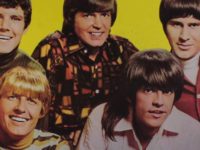Still teenagers when fame came calling, the McCoys seized the charts late in 1965 with “Hang On Sloopy,” while the following year yielded hits with covers of Little Willie John’s “Fever” and Ritchie Valens’ “Come On Let’s Go.” Based out of Union City, Indiana, the band issued a series of additional ace singles – plus a pair of albums Hang On Sloopy and You Make Me Feel So Good – before the psychedelic revolution arrived and different perceptions were explored.
Even for the experimental era which it was released, Infinite McCoys (Mercury Records) serves to be a rather odd duck. Embracing a vast array of moods and motifs, the band revealed how dead serious they were about burying their image as a radio-ready pop act.
A twangy country approach introduces “Open Your Eyes,” prior to developing into crashing waves of acid-dusted distortion, and “Jesse Brady” is a funky blues number. Both “Union City Waltz” and “Resurrection” are squiggly cocktail jazz pieces, and the progressively arranged “Genesis Through a Window” is marked by medieval piano drills. Country aspirations rise again on a remake of Tom Buckley’s “Song For Janie” – and then there’s the ghostly psychedelic sensations of “Faces,” which is emboldened by a hypnotic melody and paralyzing harmonies.
Wildly ambitious, Infinite McCoys heavily emphasizes the McCoys’ impressive chops and unconventional songwriting techniques.
Although the album failed to generate the attention hoped for, there are enough intriguing inventions here to keep the customer satisfied. Infinite McCoys may poach samplings from a variety of musical languages, but praise must be given to the band for not really sounding like anyone except their own unique selves.
The McCoys cut a subsequent album, Human Ball of similar intent, but little interest was to be had. The band ultimately splintered, then joined forces with the late blues legend Johnny Winter.
Lead vocalist and lead guitarist Rick Zehringer soon changed his last name to Derringer, and hooked up with Johnny’s brother Edgar. Rick launched a solo career in 1973 that rewarded him with the title of guitar hero. Rick Derringer has since played with a slew of artists, ranging from Steely Dan and Barbra Streisand to Kiss, Cindi Lauper and Ringo Starr.
- ‘Magic’ Wasn’t One-Hit Wonder Pilot’s Only Quirky, Radio-Ready Treasure - April 18, 2025
- How ‘Hollies Sing Hollies’ Showed New Promise After Graham Nash’s Exit - November 14, 2024
- Barry Melton on Country Joe and the Fish, Woodstock – and That Chant - August 15, 2024




